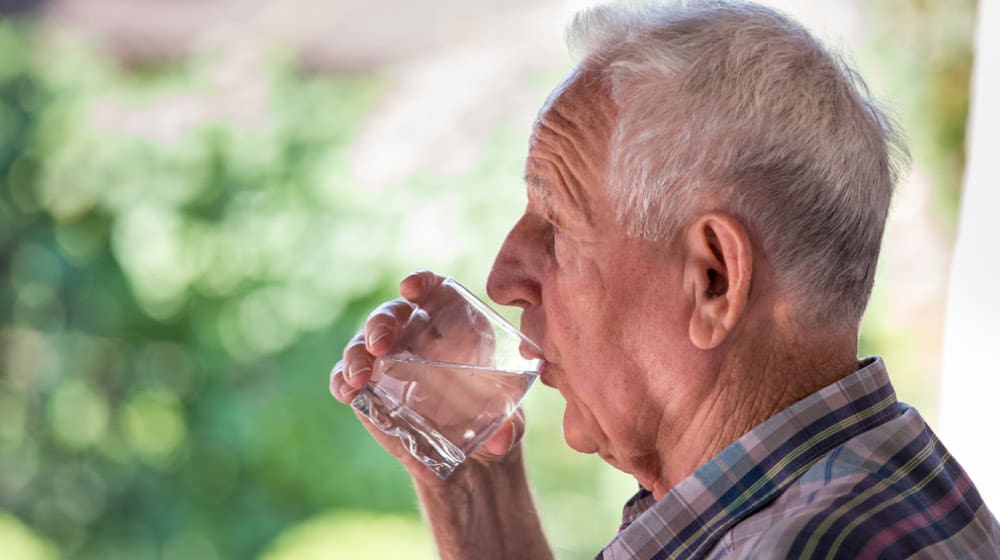As we age, our body’s fluid reserve becomes smaller, our ability to store water decreases, and our thirst sense becomes less intense. Chronic conditions such as diabetes and dementia, alongside certain drugs, can exacerbate these issues.
If your parents have Alzheimer’s disease, they will likely face dehydration.
Read on for more information regarding dehydration in patients with Alzheimer’s, including indicators, causes, and prevention.
Everything You Need to Know About Dehydration in Patients With Alzheimer’s
Signs of Dehydration in Senior Citizens with Alzheimer’s
The first indicators when someone with Alzheimer’s is dehydrated are increased disorientation and a change in typical behavior.
According to research, dehydration results in a decline in cognitive function. A drop in brain hydration can cause short-term memory loss and difficulty with attention. In addition, dehydration causes brain cells to diminish in size and mass, which is frequent in seniors who have been dehydrated for years. This study also showed that rehydration with water supplementation reduced tiredness, short-term memory loss, and attention difficulty.
Changes in urination, such as infrequent urination, darker urine color, or strong urine odor, can also indicate dehydration. Certain medicines and supplements may cause urine to darken, so it’s best to evaluate your parent’s entire symptoms before diagnosing dehydration.
Other symptoms of insufficient fluid intake include:
- Muscle cramping
- Dizziness
- Dry mouth
- Fatigue
- Less frequent urination
- Decreased skin elasticity
Dehydration, if ignored, can lead to more significant complications in dementia patients, such as nausea, fast heart rate, difficulty moving or walking, fainting, vomiting or diarrhea, and urinary tract infections.
Common Causes of Dehydration in Senior Citizens with Alzheimer’s
Inability to Detect Thirst
The region of the brain that recognizes fluid imbalance is one cause. It is in charge of notifying people when they are thirsty. Therefore, dementia progresses if that part does not work correctly.
Moreover, the body’s ability to recognize dehydration diminishes with age. A senior in the early stages of dementia may be less responsive to thirst and less likely to recall when they last drank water.
Medication
Diuretics, often known as water pills, accelerate sodium and water removal from the body. Most of these medications assist the kidneys in releasing more sodium into the urine. Sodium helps remove water from the blood, reducing fluid from veins and arteries, which lowers blood pressure.
Unfortunately, diuretics are particularly prone to cause dehydration. If your parents take too high a diuretic dose or do not drink enough fluids while using it, they can quickly get dehydrated.
Certain Medical Conditions
If your parents have uncontrolled or untreated diabetes, they are at a higher risk of dehydration. Kidney disease, as well as drugs that increase urine, also raise the risk.
The bad news is that even a cold or sore throat can make your elderly loved one more vulnerable to dehydration because they don’t feel like eating or drinking when sick.
Problems in Mobility or Communication
As their aging progresses, seniors are more likely to experience mobility issues that limit their capacity to fetch water for themselves. Dehydration in patients with dementia can also be aggravated by memory loss. As Alzheimer’s progresses, seniors may forget where they keep their glasses, how to turn on the tap, or how to open a bottle of water.
Communication issues lead to the inability of an elder to articulate thirst to a caregiver. In other cases, they may experience a complete lack of thirst and not comprehend why they need water.
Urinary Incontinence
In the mid-to-late stage of dementia, urinary incontinence is prevalent.
Urge incontinence causes patients to have a sudden, intense urge to urinate, followed by involuntary urine leakage. Meanwhile, overflow incontinence leads to frequent or constant dribbling of urine.
Seniors may reduce their water consumption to minimize frequent urination, which can contribute to dehydration.
Prevention Tips for Dehydration in Senior Citizens with Alzheimer’s
- Set reminders. Notes and alarms can help remind your parents to hydrate on a regular basis. Reminders can be a post-it note on the fridge or their water bottle. Phone alarms at regular intervals can also be effective.
- Consume water-rich snacks. Melon, cucumbers, yogurts, and smoothies are perfect nutritious snacks providing nutritional support in liquid form. Pre-made shakes, such as Ensure, also help seniors stay hydrated.
- Make them their favorite drinks. Water isn’t the sole hydration option. Offering more delicious options could help your parents prevent dehydration. Sports drinks, juice, and smoothies are all excellent choices. Remember to tell your seniors that caffeine and alcohol are diuretics that cause increased urination.
- Have water nearby. Having water close to elderly individuals with dementia can help remind them to drink water frequently, reducing dehydration. This tip is handy for those who struggle to fetch their own.
If you have questions about dehydration in patients With Alzheimer’s or any conditions discussed here, connect with us and learn more.
At 12 Oaks, our team of caring professionals is dedicated to keeping residents safe, engaged, and connected to their families and friends while leading fulfilling lives. 12 Oaks senior living communities are an ideal place to enjoy the encore season of life.
For questions or to book a scheduled personalized tour, don’t hesitate to contact us.
SUBSCRIBE TO OUR BLOG
Are you searching for senior living help? At 12 Oaks Senior Living, we would love to learn more about your unique needs and the opportunity we may have to help you meet them. Our blog is one of the valuable resources we provide to inform and encourage seniors to lead fulfilling and thriving lives. Contact us today to schedule a virtual tour.
